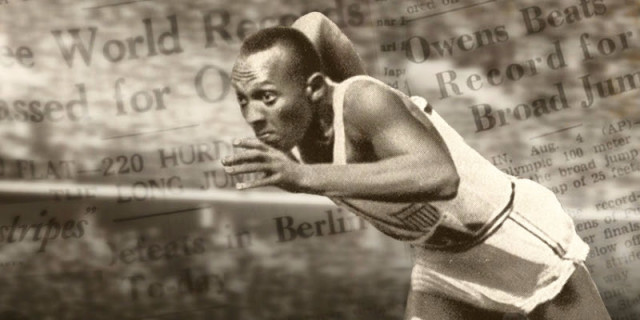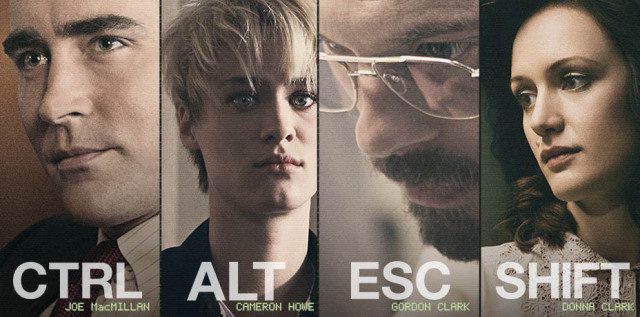Real Hero Jesse Owens: “Hitler Didn’t Snub Me — It Was Our President” by Lawrence W. Reed
James Cleveland “Jesse” Owens famously won four gold medals, all at the 1936 games in Berlin, Germany. But in the hearts of Americans who know their Olympic history, this African American man did more than win races: he struggled against racism.
At the time of Owens’s death in 1980 at age 66, President Jimmy Carter paid this tribute to him:
Perhaps no athlete better symbolized the human struggle against tyranny, poverty, and racial bigotry. His personal triumphs as a world-class athlete and record holder were the prelude to a career devoted to helping others. His work with young athletes, as an unofficial ambassador overseas, and a spokesman for freedom are a rich legacy to his fellow Americans.
Carter’s words were especially fitting in light of an unfortunate fact in Owens’s life: unforgivably, a previous American president had given him the brush-off.
Born in Alabama in 1913, James Owens at the age of nine moved with his family to the town in Ohio that bore his middle name, Cleveland. His first school teacher there asked him his name. With a deep Southern twang, he replied “J.C. Owens.” She heard “Jesse,” so that’s what she wrote down. The name stuck for the next 57 years.
Jesse could run like the wind and jump like a kangaroo. He broke junior high school records in the high jump and the broad jump. In high school, he won every major track event in which he competed, tying or breaking world records in the 100-yard and 220-yard dashes and setting a new world record in the broad jump. Universities showered him with scholarship offers, but he turned them all down and chose Ohio State, which wasn’t extending track scholarships at the time.
Imagine it. You come from a relatively poor family. You could go to any number of colleges for next to nothing, but you pick one you have to pay for. At 21, you have a wife to support as well. So what do you do? If you are Jesse Owens, you work your way through school as a gas station attendant, a waiter, an all-night elevator operator, a library assistant, even a page in the Ohio legislature. Owens worked, studied, practiced on the field, and set more records in track during his years at OSU.
The biography at JesseOwens.com tells the stunning story that unfolded in 1935:
Jesse gave the world a preview of things to come in Berlin while at the Big Ten Championships in Ann Arbor on May 25, 1935, [where] he set three world records and tied a fourth, all in a span of about 45 minutes. Jesse was uncertain as to whether he would be able to participate at all, as he was suffering from a sore back as a result of a fall down a flight of stairs. He convinced his coach to allow him to run the 100-yard dash as a test for his back, and amazingly he recorded an official time of 9.4 seconds, once again tying the world record. Despite the pain, he then went on to participate in three other events, setting a world record in each event. In a span of 45 minutes, Jesse accomplished what many experts still feel is the greatest athletic feat in history — setting three world records and tying a fourth in four grueling track and field events.
Ohio wasn’t the Deep South, but in the mid-1930s, it wasn’t a paradise of racial equality, either. OSU required Owens and other black athletes to live together off campus. They had to order carryout or eat at “black-only” restaurants and stay in segregated hotels when traveling with the team.
The eyes of the world were focused on Berlin in early August 1936. Five years earlier and before the Nazis came to power, the German capital had been selected as the site for the summer 1936 Olympic games. An effort to boycott them because of Hitler’s racism fizzled. It would be a few more years before events convinced the world of the socialist dictator’s evil intentions. Jesse Owens entered the competition with Americans thrilled at his prospects but wondering how Hitler would react if “Aryan superiority” fell short of his expectations.
Jesse didn’t go to Berlin with a political axe to grind. “I wanted no part of politics,” he said. “And I wasn’t in Berlin to compete against any one athlete. The purpose of the Olympics, anyway, was to do your best. As I’d learned long ago … the only victory that counts is the one over yourself.”
If, a hundred years from now, only one name is remembered among those who competed at the Berlin games, it will surely be that of Jesse Owens.
Owens won the 100-meter sprint, the long jump, the 200-meter sprint, and the 4 x 100 sprint relay. In the process, he became the first American to claim four gold medals in a single Olympiad. Owens waved at Hitler and Hitler waved back, but the nasty little paper-hanger expressed his annoyance privately to fellow Nazi Albert Speer. He opined that blacks should never be allowed to compete in the games again.
A side story of Owens’s Berlin experience was the friendship he made with a German competitor named Lutz Long. A decent man by any measure, Long exhibited no racial animosity and even offered tips to Owens that the American found helpful during the games. Of Long, Owens would later tell an interviewer,
It took a lot of courage for him to befriend me in front of Hitler.… You can melt down all the medals and cups I have and they wouldn’t be a plating on the 24-karat friendship I felt for Lutz Long at that moment. Hitler must have gone crazy watching us embrace. The sad part of the story is I never saw Long again. He was killed in World War II.
Back home, ticker tape parades feted Owens in New York City and Cleveland. Hundreds of thousands of Americans came out to cheer him. Letters, phone calls, and telegrams streamed in from around the world to congratulate him. From one important man, however, no word of recognition ever came. As Owens later put it, “Hitler didn’t snub me; it was our president who snubbed me. The president didn’t even send a telegram.”
Franklin Delano Roosevelt, leader of a major political party with deep roots in racism, couldn’t bring himself to utter a word of support, which may have been a factor in Owens’s decision to campaign for Republican Alf Landon in the 1936 presidential election.
“It all goes so fast, and character makes the difference when it’s close,” Owens once said about athletic competition. He could have taught FDR a few lessons in character, but the president never gave him the chance. Owens wouldn’t be invited to the White House for almost 20 years — not until Dwight Eisenhower named him “Ambassador of Sports” in 1955.
Life after the Olympics wasn’t always kind to Jesse Owens. When he wanted to earn money from commercial endorsements, athletic officials yanked his amateur status. Then the commercial offers dried up. He was forced to file for bankruptcy. He felt the sting of racial discrimination again. But for the last 30 years of his life, until he died in 1980 of lung cancer, he found helping underprivileged teenagers to be even more personally satisfying that his Olympic gold medals.
For further information, see:
Jeremy Schaap’s Triumph: The Untold Story of Jesse Owens and Hitler’s Olympics
David Clay Large’s Nazi Games: The Olympics of 1936
Lawrence W. (“Larry”) Reed became president of FEE in 2008 after serving as chairman of its board of trustees in the 1990s and both writing and speaking for FEE since the late 1970s.
EDITORS NOTE: Each week, Mr. Reed will relate the stories of people whose choices and actions make them heroes. See the table of contents for previous installments.






